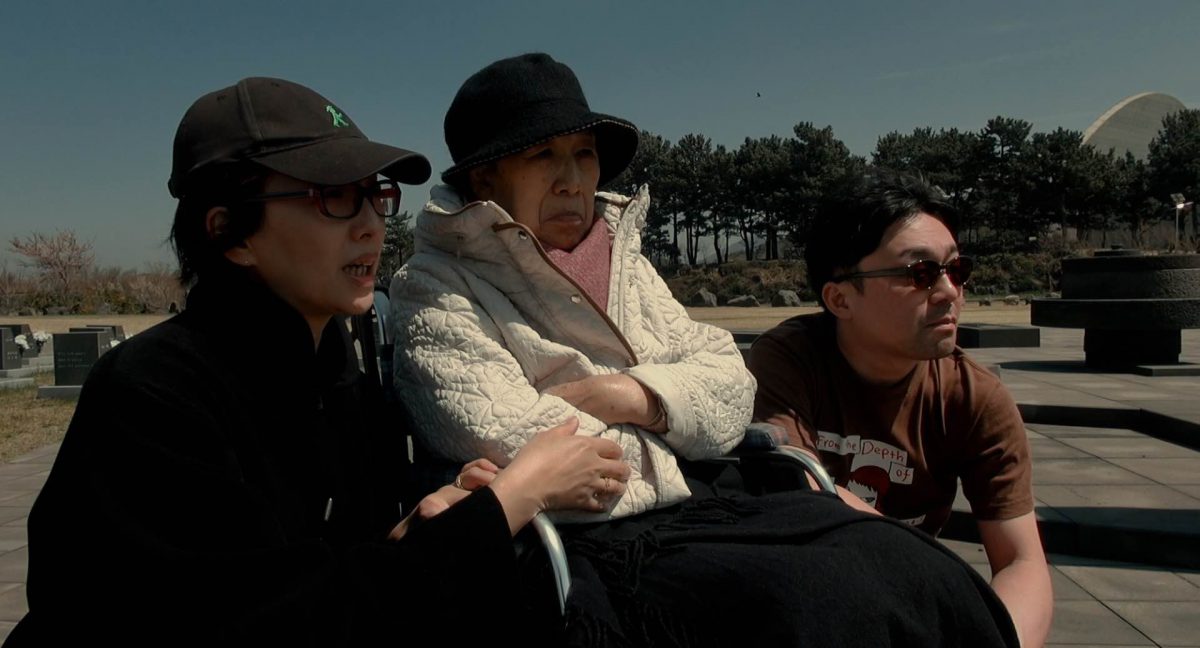Film Criticism Workshop
An Ending and a Beginning
Soup and Ideology by Yang Yong-hi

By now, Yang Yong-hi’s family should be used to being shot on film. After all, they’ve been subjected to it for more than two decades, as a means for the director to question not only her family’s dedication to the North Korean regime to the point of sending its sons as presents to the Leader (Dear Pyongyang), but also their multi-decade monetary support of the failing regime.
Many thematic threads begun in Yang’s previous films find their conclusion here. The boyfriend her father pesters Yong-hi about in Dear Pyongyang, is found. He isn’t a Korean, let alone one that supports the North, as her parents would like. Instead, he is from the enemies of the regime—a Japanese—but her mother doesn’t object. Whether it’s because of her onset dementia, or maybe simply because of parental love, is never said. But it doesn’t really matter, because she seems to like him a lot. She makes him samgyetang, a traditional chicken soup, the first day he visits. In a heartfelt scene, she fills the chicken with 40 choicest pieces of Aomori garlic and special ginseng, barely hiding her excitement from her filming daughter.
Later, she teaches the boyfriend, named Kaoru, how to make the soup, and he makes it for her (they eat almost everything, leaving only bones for Yong-hi, who is filming). She even sings him one of her favorite propaganda songs and shows him her treasured portraits of Kim Il-Sung and Kim Jong-Il. He, unlike Yong-hi, seems not to mind the old woman’s zeal for a regime labeled evil by most. Instead, he accepts his partner’s mother’s fervor, urging Yong-hi to do so as well.
Though they might be different, they should still share meals together as a family, he tells her. And for the first time in decades, Yong-hi seems to stop prodding her parents about their political affiliations. It is as if the act of sharing chicken soup has put a halt to her ideological opposition to her parents and somewhat put her mind at ease.
That is not to say that Soup and Ideology is bereft of the political-within-the-intimate themes explored by Yang in her previous films. Here, she chooses not to focus on her mother’s continued dedication to the DPRK, but on her experience during the Jeju Uprising from 1948, a gruesome anti-Communist campaign initiated by Rhee Syngman, the first president of the then supposedly democratic South.
The mother does not disclose this story to her filming daughter, but to a team of researchers visiting her from Korea. Through them, Yong-hi, and we, by extension, learn that the now pro-North Korean activist was only 18 years old and soon to be married to a doctor from Jeju Island. However, her life changed completely when the inhabitants of the island decided to protest the division of the peninsula. This resulted in the police killing them indiscriminately. Her uncle was brutally murdered, as well as her fiancée and many of island’s inhabitants. And with them, their whole families, sometimes entire villages. “If someone from your village was identified among the dead, the entire village would be burned down,” as she tells her daughter for the first time. She was lucky because she could run away to her family in Japan, a country that has functioned both as a home and as a safe haven which would allow her to support the regime she does. In a sense, as explored by the director in her previous film, her mother was allowed to become so engaged with the pro-North Chongryeon precisely because she was living in Japan.
The memories of the South’s violence against the so-called Reds are not presented as a matter of fact. They affect the director’s mother to the point they seem to bring on her Alzheimer’s. In a way, the introduction of the previously unwanted Japanese boyfriend and the forced recall of her past seem to be equally at fault for her disease.
On the other hand, the introduction of Kaoru brings a seismic shift in the movie’s presentation and, from behind the camera, Yong-hi moves in front of it. Though this initially might be necessitated by her mother’s disease and the need for the daughter to have both hands free so she can help her, as the movie progresses there seems to be more to it. It’s as if she’s ready to move from behind the camera and be the judge of everyone in the same way her parents were more than a decade ago. At first, we understand her position only vaguely, but as time progresses, we get to know her better.
This reaches a climax towards the end when the new family, consisting of mother, daughter, and future son-in-law, visit Jeju Island, and the ways the supposedly democratic and pro-American (and by extension, good) government of South Korea treated the island’s citizens come to the surface. In a long scene that is, frankly, difficult to endure for its honesty, Yong-hi seems to manage to finally understand why her mother can’t trust the South. But it’s too late, as the mother’s memories seem to have transferred to the daughter, who has grown weary of the South, instead of her docile mother. Or, at least, she has begun to understand her mother’s dedication towards the North and complete distrust of anything from the South.
In many ways, Soup and Ideology feels like an ending of a story begun more than two decades ago. The movie manages to an end many of the threads started in the director’s first three movies, while giving a way for a new beginning. One open to all possibilities.
Martin Lukanow
